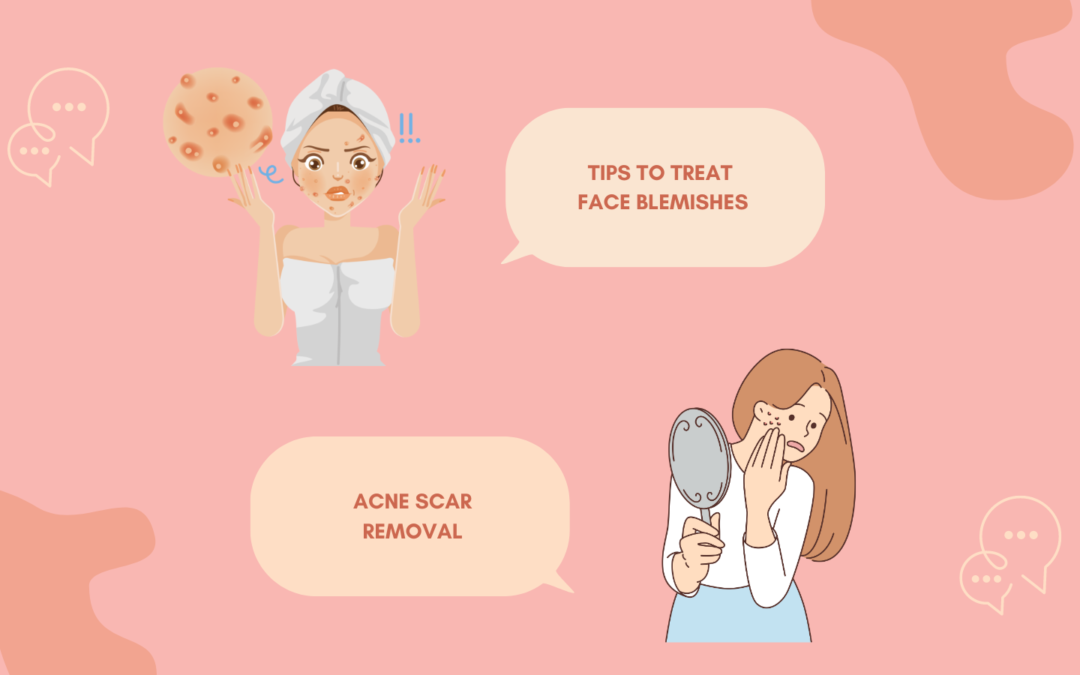Skin blemishes are a common concern affecting people of all ages. They can range from mild to severe and can impact self-confidence. This comprehensive guide will help you understand the causes of skin blemishes and provide effective strategies to manage and prevent them.
C-Tone is an organic and hypoallergenic camouflage that conceals imperfections of the skin like blemishes or discoloration to give you the flawless skin you’ve always dreamt of!
Skin blemishes refer to any mark, spot, discoloration, or flaw that appears on the skin. Common types include:
- Acne: Pimples, blackheads, and whiteheads caused by clogged pores.
- Hyperpigmentation: Dark spots or patches resulting from excess melanin production.
- Scars: Marks left on the skin after an injury or acne.
- Rosacea: Chronic redness and sometimes pus-filled bumps.
- Moles: Small, dark skin growths that can be benign or malignant.
- Melasma: Dark, discolored patches often caused by hormonal changes.
Causes of Skin Blemishes
Understanding the root causes can help in effective treatment and prevention:
- Hormonal Changes: Fluctuations in hormones, particularly during puberty, pregnancy, or menstruation, can cause acne and other blemishes.
- Genetics: A family history of acne or other skin issues can increase your risk.
- Diet: High sugar and dairy intake can exacerbate acne.
- Stress: Stress can lead to hormonal imbalances and inflammation.
- Poor Skin Care: Inadequate cleansing and the use of harsh products can irritate the skin and cause blemishes.
- Environmental Factors: Pollution and UV exposure can lead to hyperpigmentation and other blemishes.
Preventive Measures
Taking preventive steps can minimize the occurrence of blemishes:
- Establish a Skincare Routine
- Cleanse: Use a gentle cleanser twice a day to remove dirt and excess oil.
- Exfoliate: Exfoliate regularly to remove dead skin cells, but avoid over-exfoliation which can irritate the skin.
- Moisturize: Choose a moisturizer suitable for your skin type to maintain hydration.
- Protect: Always apply a broad-spectrum sunscreen with SPF 30 or higher.
- Healthy Diet and Hydration
- Balanced Diet: Eat a diet rich in fruits, vegetables, whole grains, and lean proteins.
- Hydration: Drink plenty of water to keep your skin hydrated and flush out toxins.
- Stress Management
- Relaxation Techniques: Practice yoga, meditation, or deep breathing exercises to manage stress.
- Adequate Sleep: Aim for 7-9 hours of sleep per night to allow your skin to repair and regenerate.
- Avoid Touching Your Face
- Hands Off: Keep your hands away from your face to prevent the transfer of bacteria and oils that can clog pores.
Treatment Options
If you already have blemishes, there are various treatments available:
- Over-the-Counter Products
- Salicylic Acid: Helps to unclog pores and reduce inflammation.
- Benzoyl Peroxide: Kills acne-causing bacteria and helps reduce oil production.
- Retinoids: Promote cell turnover and prevent clogged pores.
- Vitamin C: Brightens the skin and reduces hyperpigmentation.
- Prescription Medications
- Topical Antibiotics: Reduce bacteria and inflammation.
- Oral Antibiotics: Used for more severe acne to target bacteria from within.
- Hormonal Treatments: Birth control pills or anti-androgens can help regulate hormones.
- Isotretinoin: A powerful oral medication for severe acne, reducing oil production and inflammation.
- Professional Treatments
- Chemical Peels: Exfoliate the top layer of skin, promoting cell turnover and reducing blemishes.
- Microdermabrasion: Gently removes the outer layer of skin to improve texture and tone.
- Laser Therapy: Targets hyperpigmentation and reduces the appearance of scars.
- Microneedling: Stimulates collagen production to improve skin texture and reduce scars.
When to See a Dermatologist
If over-the-counter treatments are not effective, or if you have severe or persistent blemishes, it’s essential to consult a dermatologist. They can provide personalized treatment plans and may recommend prescription medications or professional procedures tailored to your skin’s needs.
Conclusion
Skin blemishes, while common, can be managed effectively with the right approach. By understanding their causes and incorporating preventive measures into your daily routine, you can achieve clearer, healthier skin. Remember, consistency is key, and it may take time to see significant improvements. For persistent issues, seeking professional advice is always a good idea. Here’s to a blemish-free, confident you!

